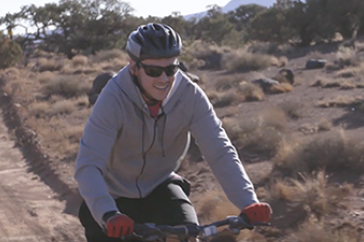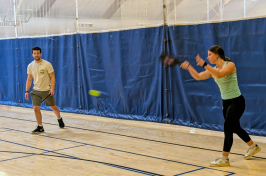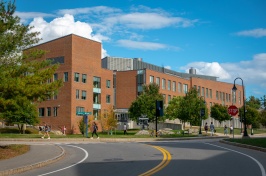UNH Research Finds Wilderness Therapy More Effective and Less Expensive

Credit: Legacy Outdoor Adventures
According to UNH researchers, outdoor behavioral therapy, which involves therapeutic wilderness experiences, is more effective and less expensive than other forms of treatment in helping teens with substance abuse and mental health issues.
DURHAM, N.H. – Substance use and mental health issues have become a major societal problem across the United States, especially for teens. Some experts say it has even reached epidemic proportions with no signs of letting up. The quest to find effective treatment options has led many parents and healthcare professionals to outdoor behavioral healthcare (OBH), commonly referred to as wilderness therapy. However, one of the challenges has been cost because many programs are not covered by insurance companies. But in the first-of-its-kind study, researchers at the University of New Hampshire have found that OBH is not only more effective but is cheaper than more traditional treatments.
“This is the last piece of the puzzle that could finally tip the scales to help families struggling to afford treatment for their kids,” said Mike Gass, professor of outdoor education. “It offers evidence to insurance companies that it is more cost effective to provide coverage for outdoor behavioral therapy than current forms of treatment. We already know that adolescents that go through OBH programs show almost three times more improvement after one year. Now we can say that it is also two times less expensive.”
In the study, recently published in the journal Substance Abuse: Research and Treatment, researchers looked at clients who were 13 to 17 years old who had both substance use and mental health issues. Researchers compared three different treatment options, OBH, treatment as usual (TAU) - which includes residential facilities, outpatient, and other traditional healthcare – or, no treatment at all. When adjusted for completion rates (94% for OBH and 37% for TAU), the actual costs per person for a 90-day treatment were $27,426 for outdoor behavioral therapy compared to $31,113 for treatment as usual.
“This is an exciting new era of behavioral healthcare,” said Gass. “Our hope is that healthcare and insurance professionals will use this information to advocate for better coverage for these clients and their families. And, also help those who are forgoing any treatment at all who ultimately become a burden on society with increased trips to the emergency room, more time in jail, dependence on welfare and even death.”
OBH is a growing, innovative and therapeutic intervention for adolescents struggling with emotional, behavioral, relational and substance abuse disorders. OBH therapists not only deliver the same therapeutic elements often implemented in traditional office therapies, but also supplement these with prescriptive use of wilderness experiences (hiking, backcountry travel, rock climbing) led by licensed mental health professionals to meet the therapeutic treatment needs of clients. Programs also include group-living and group therapy as well as one-on-one counseling sessions.
This study was partially funded by the National Association for Therapeutic Schools and Programs (NATSAP), the Outdoor Behavioral Healthcare Council (OBHC), and the Klein Family.
The University of New Hampshire inspires innovation and transforms lives in our state, nation, and world. More than 16,000 students from all 50 states and 71 countries engage with an award-winning faculty in top-ranked programs in business, engineering, law, health and human services, liberal arts and the sciences across more than 200 programs of study. As one of the nation’s highest-performing research universities, UNH partners with NASA, NOAA, NSF and NIH, and receives more than $110 million in competitive external funding every year to further explore and define the frontiers of land, sea and space.
VIDEO TO DOWNLOAD:
Link: https://youtu.be/B_QDOStiBNM
Credit: University of New Hampshire
Caption/Description: Professor Mike Gass talks about the use of outdoor behavioral healthcare (OBH) to help teens with substance abuse and mental health issues. His research shows OBH has a higher completion rate, is more effective and costs less than current forms of treatment. OBH uses wilderness experiences - such as hiking, backcountry travel, climbing - to meet treatment needs of clients. Gass, a professor of outdoor education, is also the director of UNH’s Outdoor Behavior Healthcare Research Center, the oldest nationally accredited university outdoor education program in the nation.
Latest News
-
October 8, 2025
-
October 2, 2025
-
September 24, 2025
-
September 15, 2025
-
August 21, 2025














































